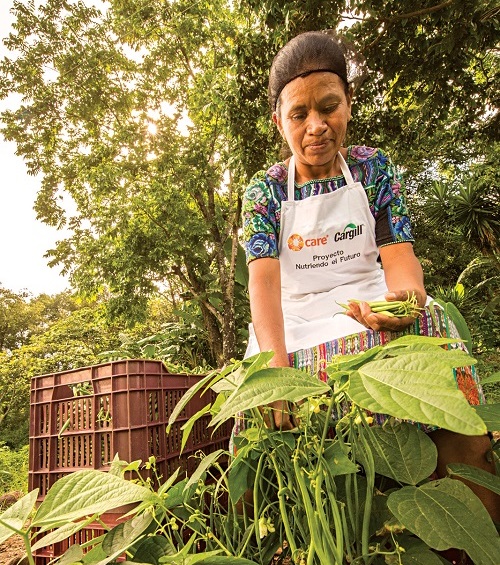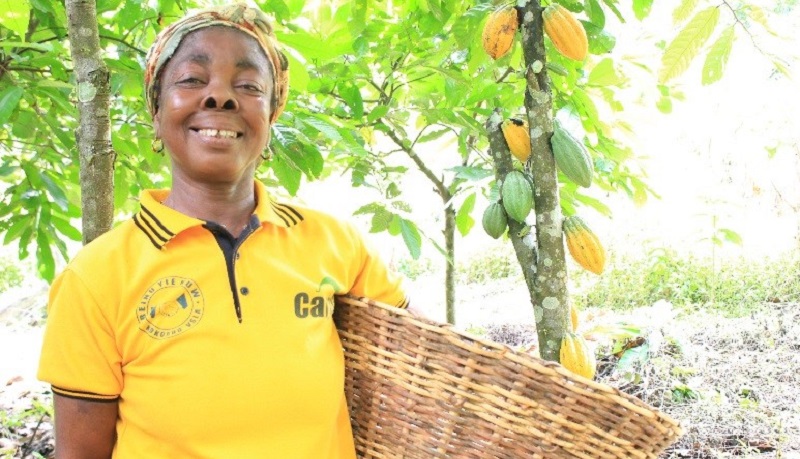Catalyst for change
How a Cargill-CARE partnership is helping lift rural women out of poverty
March 02, 2018
 Maria Morales received funding to farm a larger plot of land. "I am so blessed."
Maria Bernarda Balan Morales farms green beans on a small plot in San Martin Jilotepeque, Guatemala. For years, she struggled to make ends meet, managing a small plot on her own with inconsistent crops.
Maria Morales received funding to farm a larger plot of land. "I am so blessed."
Maria Bernarda Balan Morales farms green beans on a small plot in San Martin Jilotepeque, Guatemala. For years, she struggled to make ends meet, managing a small plot on her own with inconsistent crops.
She lacked transportation and was only able to sell the beans she could carry on her back to the local market. She has supported her six children for more than five years after her husband left them.
Her outlook changed when she was approached by CARE, an international humanitarian organization that partnered with Cargill to launch “Nutriendo el Futuro” (Nourishing the Future) in 2014, aiming to improve the lives of women and children in Central America.
Through Nourishing the Future, Morales received some initial funding to help her start planting a larger plot of land and training on proper planting techniques. The program connected her with other farmers to form a cooperative for better market access and cost-sharing.
As a result of the program, green bean producers increased their production by 13.8 percent to 8.31 tons per hectare. Their proportion of harvest sold to market went up a stunning 90.9 percent. Before the program, just 7.9 percent of the green beans produced sold at market. In a year, Morales’ production doubled.
“I am so blessed,” she said. “For me this is a step ahead. I am motivated to keep improving and doing better for my children so they can someday go to college and become professionals.”
Empowering women worldwide
Morales is just one of more than 300,000 people touched by the CARE-Cargill partnership worldwide since 2013. Cargill has partnered with CARE for more than 50 years to combat global poverty and improve food and nutrition security for communities around the world. In addition to the Nourishing the Future program in Honduras, Guatemala, Nicaragua and Costa Rica, the partnership works in Cote d’Ivoire, Egypt, Ghana, India and Indonesia. Each country program is unique, but works to build production capacity of smallholder farmers, connect producers to markets, improve nutrition and food security of communities as well as enhance access to education and better sanitation and health.
In Ghana, for example, the partnership focuses on helping female cocoa farmers like Ekua Pamfoa. When the 65-year-old lost her husband, the enormous costs for a traditional burial and the loss of income left her with few options to keep her family afloat.
Pamfoa borrowed money from a neighbor using her small two-acre cocoa farm as collateral, but fell into deeper debt trying to feed her six children and pay school fees.
“For several months, I lost ownership of my cocoa farm because the lender had decided to use proceeds from my harvest to defray the debt,” she said. “My children had to miss school often because I barely had enough money at the time to finance their education.”
She found hope in a CARE Village Savings and Loans Association (VSLA) called “Beinu Ye” (which translates to “two is better than one.”) The associations, also organized in Ghana, Cote d’Ivoire and India as part of the Cargill – CARE partnership, help rural women become financially self-sufficient by encouraging financial saving and giving farmers access to low-interest credit.
Pamfoa took out her first loan of GHC 800, which allowed her to pay off her debt and reclaim her cocoa farm, her family’s only source of livelihood. She also began participating in a CARE Farmer Business School, which helped her increase her cocoa-farming skills, resulting in a harvest increase from 54 kilograms of cocoa to 324 kilograms.
 With CARE's help, Ekua Pamfoa paid off her debts and reclaimed her cocoa farm.
With CARE's help, Ekua Pamfoa paid off her debts and reclaimed her cocoa farm.
The Cargill-CARE partnerships meld Cargill’s expertise in food and agriculture with CARE’s decades of success in community-led rural development, helping communities to take a leading role in identifying problems and developing solutions they can sustain for themselves.
In India, for example, a three-year program in some of the most malnourished districts in Madhya Pradesh helped fight gender inequality through improved nutrition, access to healthcare and education. The beliefs and behaviors that favor the well-being of boys in those districts have been passed down through generations and the CARE-Cargill partnership brought volunteers into communities to debunk myths and change social structures.
“The programs go so deep into communities and integrate so well with Cargill’s purpose,” said Marcela Hahn, CARE associate vice president of strategic partnerships. “Cargill’s commitment inspires us and we look forward to building on the progress we’ve made.”
More work to be done
Celvia Elizabeth Lara Xalin, a CARE employee who helps coordinate the green bean farmer program in Guatemala, said a major part of the training is restoring self-esteem.
“We focus on producers valuing themselves as women,” she said. “We help them see that it’s not just men who can work and provide for their families. Their skills help improve their family’s quality of life.”
The efforts are working. A recent CARE study, which looked at women’s empowerment among participants in Central America saw big gains. In Honduras, the empowerment index was up 21 percent. The index measures how empowered women feel to financially provide for their family and how much control they have at home to make purchasing decisions.
Still, the differences between male and female farmers is stark. In Guatemala, only one-third of female farmers said they had access to necessary tools compared to 70 percent of male farmers. In Nicaragua, 97 percent of male farmers said they had access to land compared to 20 percent of female producers.
“I don’t think we have achieved prosperous and resilient communities yet, but we are well on our way,” said Maria Hinson, senior program officer for CARE’s Food and Nutrition Security Unit.
In 2016, Cargill renewed its global commitment to CARE for three years. Moving forward, Cargill aims to create a more focused connection with its businesses and to set strong benchmarks on improvements to measure.
“We are working on how to make this partnership even more impactful,” said Michelle Grogg, Cargill’s global lead for corporate responsibility and sustainable development. “We have worked over the years to strengthen the goals and outcomes of our partnership and ensure we are aligned with our business priorities. Ultimately, we want to show how partnerships like these are helping Cargill achieve its purpose to nourish the world in a safe, responsible and sustainable way.”
